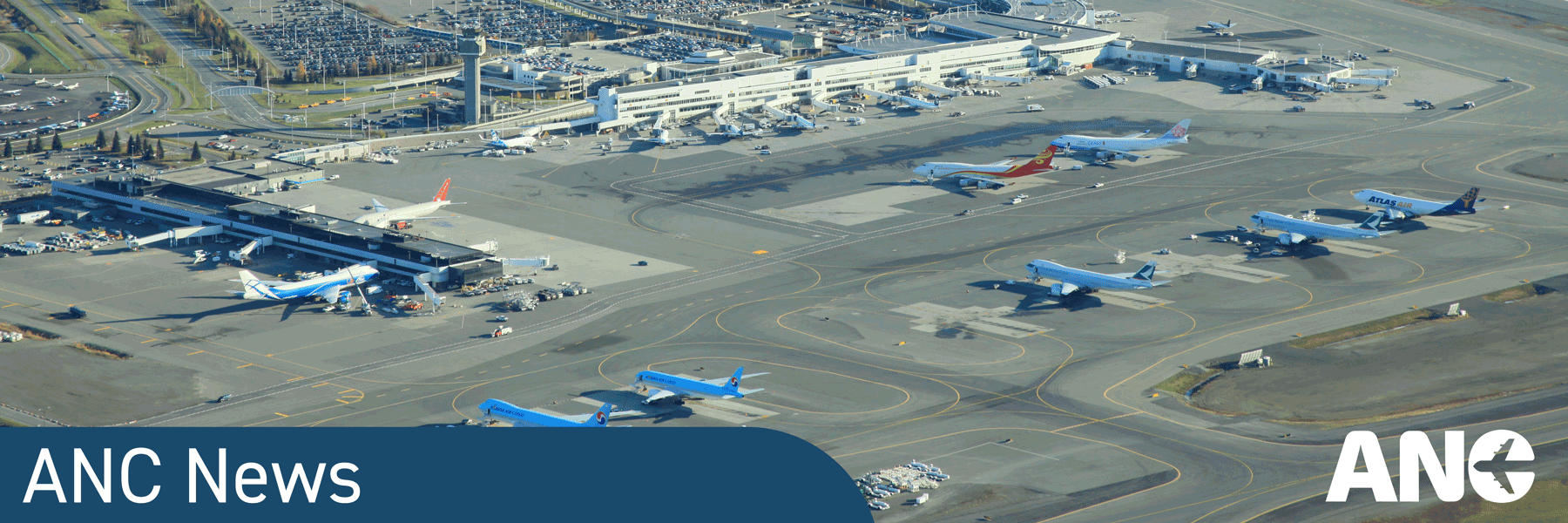
20-015
ANC receives expanded international passenger transfer rights
December 9, 2020
(ANCHORAGE) – The U.S. Department of Transportation has granted expanded international passenger transfer rights to Alaska’s international airports — Ted Stevens Anchorage International Airport (ANC), and Fairbanks International Airport (FAI). ANC is already an air cargo powerhouse, and these new passenger rights will allow airlines the ability to use belly cargo to support routes with passenger service overlaid. The rights also allow foreign airlines to better utilize U.S. partner airlines to offer more markets via connections at ANC.
These new passenger transfer rights mirror existing air cargo transfer rights that have been successfully used to help grow ANC into the world’s sixth-busiest air cargo airport.
“The Ted Stevens Anchorage International Airport (ANC) is a key part of Alaska’s economy. Annually, ANC is responsible for $1.8 billion of economic benefit to the state. These new passenger transfer rights are an asset that can help grow Alaska’s economy. I’d like to thank President Donald Trump and Secretary of Transportation Elaine Chao for all they do to help the economy of Alaska,” said Governor Mike Dunleavy.
Owing to Alaska’s geographic location, the expanded passenger rights are designed to assist Alaska’s international airports when competing with foreign airports, thereby spurring economic growth in Alaska.
“We have analyzed passenger aircraft performance and belly cargo capacity, and there is a substantial revenue opportunity for airlines to utilize ANC,” said Airport Director Jim Szczesniak. “For example, Hong Kong to Dallas nonstop has a belly cargo weight penalty—a stop at ANC eliminates that penalty and allows for more than $40,000 in additional cargo revenue for each flight.”
Szczesniak provided additional scenarios benefiting long-haul passenger airlines:
- Brisbane-Anchorage-Chicago allows an additional 24 cargo positions, an additional $64,000 or more in cargo revenue.
- Sydney-Anchorage-New York allows an additional 23 cargo positions, an additional $62,000 in cargo revenue.
- Taipei-Anchorage-Toronto transferring cargo, passengers, and taking on cargo and/or passengers. No belly cargo limitations.
- New Delhi-Anchorage-Los Angeles stopping in ANC only adds 0.5% in additional great circle distance compared to non-stop. No belly cargo limitations. A simultaneous arrival with Mumbai-Anchorage-San Francisco flight could offer short connection times for passengers and also connect traffic to a U.S. partner airline to serve Seattle or other West Coast cities.
| Passenger Transfer Rights |
|
|
|
|
|
|
|
|
|
| Cargo Transfer Rights |
|
|
|
|
|
|
|
|
|
|
|
“Transferring passengers and cargo at ANC creates synergies for airlines for more destinations, there are a lot of interesting route combinations that can benefit from routing through ANC,” said Szczesniak.
Airports within 6,000nm of ANC
Typical range for passenger aircraft at maximum belly cargo capacity
 Map generated by the Great Circle Mapper (www.gcmap.com) - copyright © 1996-2020 Karl L. Swartz.
Map generated by the Great Circle Mapper (www.gcmap.com) - copyright © 1996-2020 Karl L. Swartz.
“Before COVID-19, Alaska was one of the top five most desired destinations for foreign tourists wanting to visit the USA. With Alaska’s natural beauty and wide-open spaces, we anticipate even more demand after the concerns of the coronavirus pandemic have been addressed. With new nonstop service, Alaska’s tourism industry is poised to show visitors the splendor of Alaska. Now airlines have the ability combine additional cargo revenue with additional passenger revenue. More cargo revenue and more passenger tickets sold is a winning combination.”
ANC is the Gateway to Alaska providing guests with glimpses of the majestic Northern Lights, 8 national parks, thousands of glaciers, and unlimited natural distancing. ANC’s geographic location provides air carriers the opportunity to connect Asia, Oceania, North America, and South America. ANC is strategically located 9.5 flight hours from 90% of the industrialized world.
Air carriers can operate at ANC at much lower cost per enplaned international passenger than other West Coast gateway airports.
###
| Airline Contact: | Trudy Wassel; trudy.wassel@alaska.gov |
|
Angie Spear; angie.spear@alaska.gov |
Media Contact: |
Eland Conway; eland.conway@alaska.gov |
About Ted Stevens Anchorage International Airport
Ted Stevens Anchorage International Airport is an important gateway to the city of Anchorage and the State of Alaska. More than 5 million passengers fly through ANC annually. Ted Stevens Anchorage International Airport is responsible for approximately 22,080 airport & community jobs, earning $1 billion. That's 1 in 10 jobs in Anchorage.
The Alaska Department of Transportation and Public Facilities oversees 237 airports, 10 ferries serving 35 communities, more than 5,600 miles of highway and 776 public facilities throughout the state of Alaska. The mission of the department is to “Keep Alaska Moving through service and infrastructure.”
